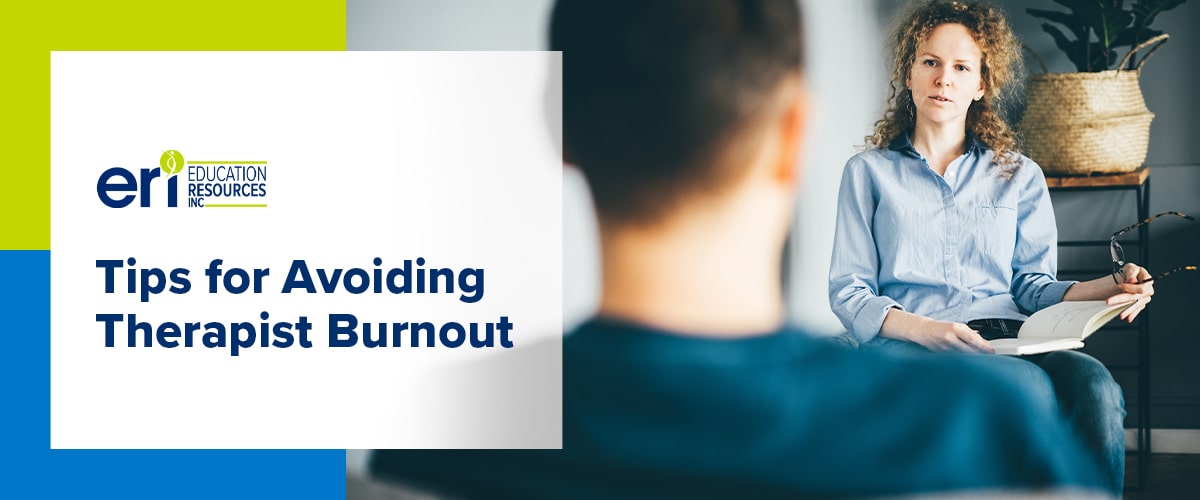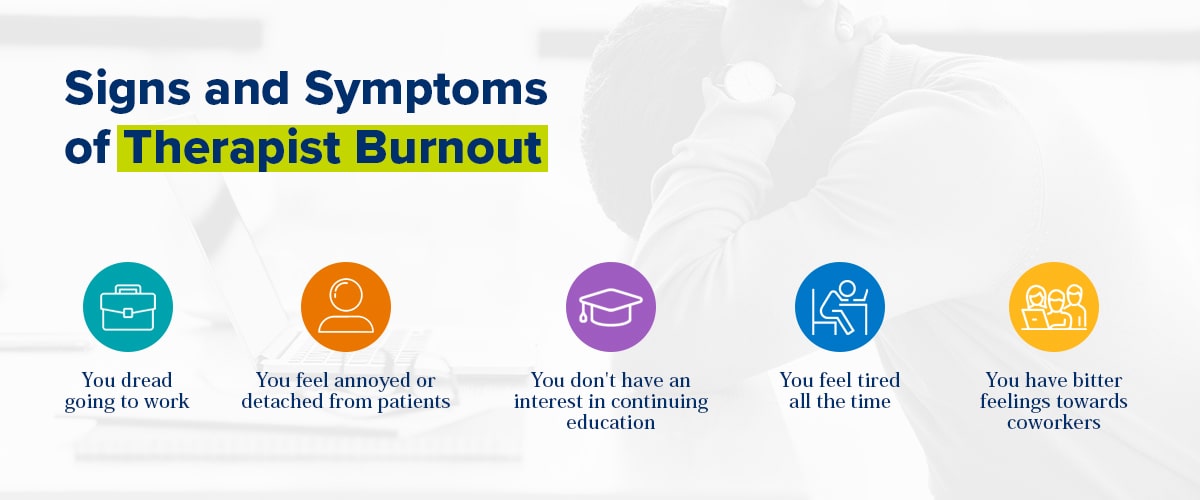 The high-stress levels and intensity often associated with delivering occupational therapy, physical therapy and speech-language pathology can be draining at times.
The high-stress levels and intensity often associated with delivering occupational therapy, physical therapy and speech-language pathology can be draining at times.
Interacting with very ill patients, challenging students or difficult team members all day and processing endless paperwork can overwhelm therapists. Therapy means lots of emotional interactions every day, which can be exhausting. If not careful, therapists might experience burnout.
How do you know if you are experiencing burnout and how can you avoid it?
What Is Therapist Burnout?
Burnout is a kind of exhaustion that comes after persistent feelings of stress. With repeated exposure to mental or physical stressors, you might start to feel overly exhausted or defeated. Everyday activities that used to feel easy or exciting gradually become overwhelming or tiring. And in a lot of cases, burnout is caused by a person’s job.
Therapist burnout often occurs as a direct reaction to the demands and difficulties of this career field. Therapists might feel cynical, bored or even annoyed with their daily tasks. Their passion for the work might shift to detachment or annoyance.
While being a therapist is extremely rewarding, it’s also overwhelming. Physical therapists, occupational therapists and speech therapists spend long days on their feet, carefully working with patients. Some patients have severe injuries or disabilities, which can be upsetting to work with every day. Whether it’s occupational therapy burnout, physical therapy burnout or speech therapy burnout, it seriously affects people and their careers.
Therapist burnout can occur at any point in a therapist’s career. It can also happen to other members in the field. For instance, physical therapist assistant burnout can develop due to similar reasons.
It’s critical to recognize the symptoms and address them before it becomes a long-term condition. Severe burnout makes you more susceptible to physical illnesses and might cause depression or anxiety. It also prevents you from properly treating clients.

Signs and Symptoms of Therapist Burnout
You can start to notice signs of burnout by recognizing common symptoms. Identifying the signs of burnout allows you to address it sooner. Here are some common signs of therapists burnout:
- You dread going to work: If you lay awake at night, dreading going back to work, something probably isn’t right. Waking up early for work is no one’s favorite thing, but you might be experiencing burnout if getting up feels impossible or useless. Excessive distressing about work might mean you feel fed up with the entire position.
- You feel annoyed or detached from patients: Therapists are known for being compassionate. But feeling annoyed with patient complaints could be a significant indicator of occupational or physical therapist burnout. You might also feel nothing at all when interacting with patients and finish sessions feeling relieved that they are over.
- You don’t have an interest in continuing education: One of the best parts of therapy — whether occupational, physical or speech-language — is that the research is constantly being updated. For many therapists, one of the joys of the position is learning more about the field and how they can help their patients further. But if you begin ignoring or avoiding continued education, you might be experiencing some burnout.
- You feel tired all the time: Chronic fatigue is a signature symptom of burnout. Daily tasks like cooking dinner or filling your car with gas might feel exhausting. And even after a full night’s rest, the tiredness doesn’t disappear.
- You have bitter feelings towards coworkers: Instead of smiling and greeting coworkers, you might feel annoyed at their positivity and dedication. Burnout could also make you isolate yourself at lunchtime or from other social occasions.
Why Does Burnout Happen?
Burnout in physical and occupational therapists often occurs because of the highly demanding nature of the field. Between the stacks of paperwork and long appointments, therapists have many responsibilities. Therapists slowly become exhausted after experiencing these high demands each day.
Here are more reasons for physical and occupational therapy burnout:
- Productivity requirements: Many therapy positions push for more sessions and productivity rather than sustained time with patients. And the pressure to maintain productivity levels creates a stressful workplace experience. Over time, this can cause burnout.
- Repetitiveness: Some therapists might grow tired of the repetitive nature of their workweek. The large amounts of paperwork become tedious, and sessions might blend together after a while.
- Physical and emotional demands: Therapists face significant emotional demands during the day. It is a big task to support patients as they rebuild muscles or work through disabilities. Some therapists could feel overwhelmed or unsupported by all the challenges they face.
- Lack of growth: After spending some time in the career, therapists might feel burned out by the lack of growth opportunities. Especially when combined with the feeling of repetition, the absence of growth paths to further your career can become frustrating.
How to Avoid Therapist Burnout
The hardest part of burnout is the feeling that nothing will change. Luckily, there are many options for avoiding and getting rid of these burnt-out feelings.
Here are some tips for avoiding therapist burnout:
- Connect with coworkers: When you’re burnt out, going out with friends is often the last thing you want to do. But reconnecting with coworkers is a great way to revitalize your love for your job. You can share some of the feelings you’ve experienced and get support from people who understand the hardships of your career.
- Take a vacation: Packed work schedules might make you feel like there’s no point in taking a vacation. You fear getting behind on work, so you decide to stick it out for a little longer. But taking a break allows your brain to reset. As you rest and enjoy yourself, your brain can relax and rejuvenate itself. You might come back to work a week or two later, ready to go.
- Switch positions: If you have worked at the same company for many years and feel burnt out, it might be time to make a change. Selecting a new position in the same field will give you new work experiences and opportunities. You can meet new colleagues and work with new patients, which can help you shake off feelings of burnout.
- Take a continuing education course: Although continuing education might seem hard for people with burnout, these courses might be just what you need to reinvigorate your interest in your field. You could learn more about different areas of the field or study new research. In turn, you might remember your passion for helping your patients.
- Be kind to yourself: It’s easy to get frustrated with feelings of burnout, but being hard on yourself only furthers the cycle. Remember to treat yourself with kindness as you navigate these feelings. Try to plan special treats for yourself or other things to look forward to during the week. It’s also important to remember your career isn’t your entire life. It’s more than okay to take time to focus on your hobbies, family and friends and remember how important they are.

Education Resources, Inc: Register for a CEU Course Today
Taking a continued education course in occupational therapy, speech pathology or physical therapy could help alleviate burnout feelings. Education Resources, Inc offers many classes in these fields. ERI’s courses will help you advance in your career and reignite your passion for the work. As a therapist-founded company, we understand the difficulties of burnout in occupational therapy, physical therapy and speech pathology. We work hard to provide the education professionals need to feel better.
Register for a CEU course with ERI today. We look forward to helping you rediscover your love for your career.
